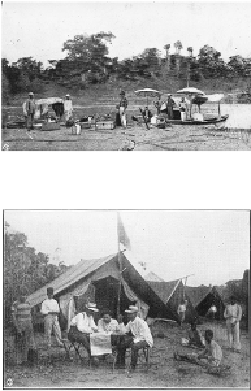Travel Reference
In-Depth Information
The greater our misadventures, the greater our impediments, the greater the rate that our other
resources diminished. The river, ever shallower, almost stagnant in the sandy straight stretches and
foaming in endless rapids, required ever increased labors and real sacrifices.
We could no longer navigate: the two heavy canoes of
itaúba
went in a dragging pulse, as though
we traveled on land, and numerous times the oars or barge poles transformed themselves into levers,
making traversing these shallows even more difficult. When night fell, these men who had slaved all
day immersed in water camped out sullenly, without a drink of coffee or
cachaça
to mitigate that
brutal regimen. They could barely set up camp. The next dawn, limping and staggering because the
river sands had sliced their festering feet to tatters, despairingly, they resumed the battle to ascend the
river that seemed as if it would never end—so extensive, so monotonous, always the same in the uni-
formity of its banks, so that we had the illusion we were making a circular voyage. We set up camp,
and after ten hours of torment in a cruel and interminable penance, we seemed to have returned to the
same beach we had left.
In contrast to this misadventure, the Peruvian Commission, which accompanied us, was complete,
well supplied, and robust. They had not suffered the distress of a shipwreck. They were twenty-three
intrepid men directed by a captain of exceptional valor.
Thus, every night on those far-off beaches there was this contrast: on one side, the miniature camp
muteanddrowningingloom;ontheother,onlyfiftymetersoff,aboisterousandwell-lit campwhere
the songs of the satisfied
cholos
of Loreto resounded.
Figure 17.4.
Brazilian camp—a meager setup.
Figure 17.5.
Peruvian camp.
The separation of the two was complete, the relations almost nil. The Castilian diffidence, the
inheritance of our elegant neighbors, was surprising in contrast to the other more heroic, wretched
group, engulfed in self-pity and retreating into its penury, meticulous about completing its business
without owing the minimum or most justifiable help to the foreigners with whom it was associated.

Search WWH ::

Custom Search